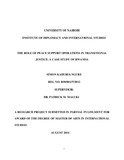| dc.description.abstract | Over the last two decades, scholarly and expert interest in the burgeoning field of transitional
justice has continued to grow, and today it is unthinkable to conceive of political transitions, or
transitions from war to peace, without also thinking about questions of accountability for past
human rights abuses and mass atrocities. This is particularly the case in relation to Africa. The
exercise of engaging in constructive change needs to transcend the symbolism that often attends
to transitional justice processes toward dealing with the underlying structures and human
relationships at various levels, politically, socially and economically. The question of transitional
justice calls for an understanding of the broader and complex issues of justice in divided
societies. It is therefore important to examine and analyze how Rwanda has implemented its
Transitional Justice process and how the UN Mission assisted in that process. The general
objective of the study is to find out the role that peace support operations played in transitional
justice in Rwanda so as to maintain unwavering peace and reconciliation amongst the citizens.
The study has adopted the Neoliberalism as the theoretical framework. A basic assumption of
neoliberalism is the institutional separation of society into an economic and political sphere, as
neoliberals claim that all problems of the economy can be resolved by socially-neutral experts
using technical rationality. Both qualitative and quantitative approaches have been used. Often in
qualitative design only one object, one case, or one unit is the focus of investigation over an
extended period of time. The research is interested in the character and the role of peace support
operations in transitional justice in Rwanda. The researcher will use it as a tool for collecting
data hoping that the analysis and questions will try and explain Rwanda’s transitional justice
process. The research has pointed out the various roles of PSOs in other parts of the world and
what they were assigned and mandated to do. It observes that in Sub-Saharan Africa their
mandate has been minimal and not specific to administering transitional justice processes.
Possibly this could be due to the nature of PSOs and how they are deployed to various regions
during peace enforcement or peace-making. Sub-Saharan Africa has been unique in the sense
that the timing and implementation of Transitional Justice has not been solely a transitioning
period, although some have. The research study however, did examine their roles and possible
future functions, factoring the context and needs on the ground. Given the cross border nature of
conflict and violence in Africa, Rwanda needs to consider mooting a policy that will address
transitional justice. In order to address border spillovers, Rwanda and Africa should set up
accountability measures to hold rebels who move beyond national borders, so as to end impunity.
A show of commitment by all the states in Africa will be vital, and also financing the justice
institutions in every country in order to strengthen its judicial capacity. Capacity building and
establishment of Africa/Civil society partnership for regional outreach and advocacy work at the
community level is important to gain local support. Dialogue and continuous consultations with
all stakeholders in the situation is necessary and important element one cannot afford to leave it
out. | en_US |

